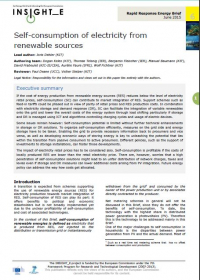Gateway to Think Tanks
| 来源类型 | Publications - External Publications - External Articles |
| 规范类型 | 其他 |
| Self-consumption of electricity from renewable sources INSIGHT_E Rapid Response Energy Brief n°6 | |
| Joris DEHLER, ; (KIT), Dogan KELES (KIT), Thomas TELSNIG (IER), Benjamin FLEISCHER (IER), Manuel BAUMANN (KIT), David FRABOULET (KIC-IE/CEA), Aurélie FAURE (IFRI), Wolf FICHTNER (KIT) | |
| 发表日期 | 2015-06-23 |
| 出版年 | 2015 |
| 概述 | A report released by Insight_E, the European energy consortium specialised on energy policy research and analysis ... |
| 摘要 |
Self-consumption of electricity from renewable sources INSIGHT_E Rapid Response Energy Brief n°6
A report released by Insight_E, the European energy consortium specialised on energy policy research and analysis
 If the cost of energy production from renewable energy sources (RES) reduces below the level of electricity retail prices, self-consumption (SC) can contribute to market integration of RES. Support schemes such as feed-in tariffs could be phased out in view of parity of retail prices and RES production costs. In combination with electricity storage and demand response (DR), SC can facilitate the integration of variable renewables onto the grid and lower the overall costs of the energy system through load shifting particularly if storage and DR is managed using ICT and algorithms controlling charging cycles and usage of electric devices. Some issues remain however: Self-consumption potential is limited without further technical enhancements in storage or DR solutions. To organize self-consumption efficiently, measures on the grid side and energy storage have to be taken. Enabling the grid to provide necessary information back to prosumers and vice versa, as well as developing economic ways of storing energy is key to unleashing the potential that lies within the transition from passive consumers to active prosumers. Different policies, such as the support of investments to storage installations, can foster those developments. The impact of electricity retail prices has to be considered also. Self-consumption is profitable if the costs of locally produced RES are lower than the retail electricity price. There are, however, worries that a high penetration of self-consumption solutions might lead to an unfair distribution of network charges, taxes and levies even if storage and DR measures can lower additional costs arising from PV integration. Future energy policy can address the way how costs get allocated.
self-consumption_renewable_electricity.pdf
|
| 关键词 | Renewable Energies |
| URL | https://www.ifri.org/en/publications/publications-ifri/articles-ifri/self-consumption-electricity-renewable-sources |
| 来源智库 | French Institute of International Relations (France) |
| 资源类型 | 智库出版物 |
| 条目标识符 | http://119.78.100.153/handle/2XGU8XDN/416006 |
| 推荐引用方式 GB/T 7714 | Joris DEHLER, . Self-consumption of electricity from renewable sources INSIGHT_E Rapid Response Energy Brief n°6 . 2015. |
| 条目包含的文件 | ||||||
| 文件名称/大小 | 资源类型 | 版本类型 | 开放类型 | 使用许可 | ||
| rreb6_insight_juin15(53KB) | 智库出版物 | 限制开放 | CC BY-NC-SA |  浏览 | ||
| self-consumption_ren(299KB) | 智库出版物 | 限制开放 | CC BY-NC-SA | 浏览 | ||
除非特别说明,本系统中所有内容都受版权保护,并保留所有权利。